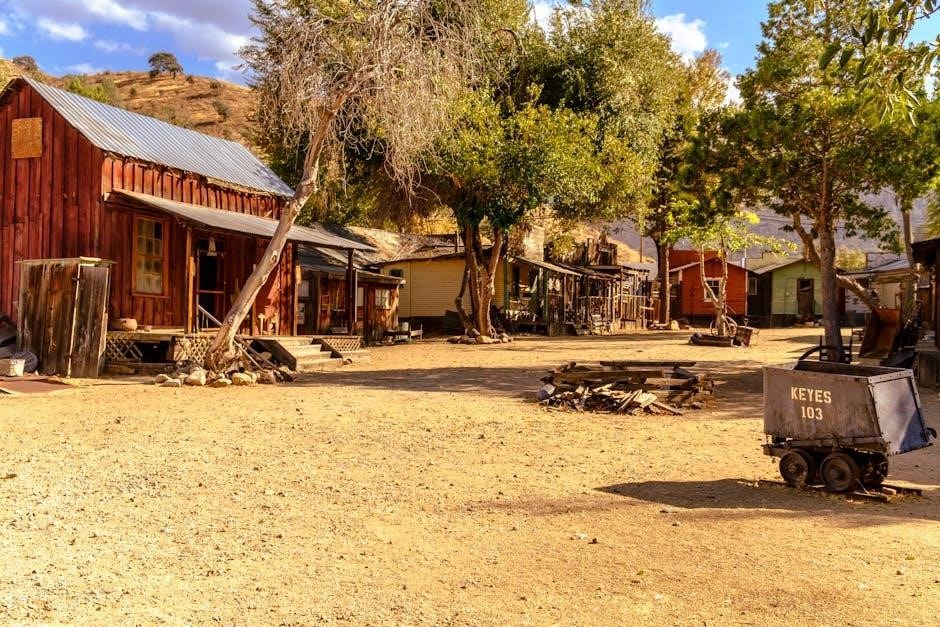America: The Story of Us is a captivating documentary series by the History Channel that explores the nation’s history through key events, cultural shifts, and the people who shaped its destiny. The series, divided into 12 episodes, offers a comprehensive journey from the early colonial period to modern times. Episode 1, titled “Rebels,” delves into the revolutionary spirit that defined America’s fight for independence. The series is complemented by educational resources, including video guides and answer keys, designed to enhance learning for students and educators alike. These materials provide insights into critical moments in U.S. history, such as the Civil War, industrialization, and immigration. The answer keys, available in PDF formats, serve as valuable tools for assessing understanding and reinforcing key historical concepts. This series is not only educational but also engaging, making history accessible and relatable for audiences of all ages.

Episode 1: Rebels
Episode 1 of America: The Story of Us focuses on the early struggles of the American colonies and their eventual rebellion against British rule. It highlights the growing tensions that led to the Revolutionary War, showcasing key events like the Boston Tea Party and the Declaration of Independence. The episode emphasizes the transformation of the colonists from loyal subjects to determined rebels. Questions in the answer key explore topics such as the number of British soldiers in the Americas by 1777 and the innovative tactics employed by George Washington. The episode also delves into the challenges faced by the Continental Army, including the harsh conditions and the development of new strategies. By examining these pivotal moments, the episode sets the stage for understanding the birth of a nation and its fight for freedom.

Key Events
The documentary series America: The Story of Us intricately weaves together pivotal moments in American history, and Episode 1: Rebels is no exception. This episode focuses on the transformative events that led to the birth of the United States as an independent nation. The answer key for this episode provides a detailed breakdown of these key events, allowing viewers to grasp the significance of each milestone.
One of the most significant events highlighted in the episode is the Boston Tea Party. This act of defiance, carried out by American colonists in 1773, was a direct response to British taxation policies, particularly the Tea Act. The colonists, disguised as Native Americans, boarded British ships in Boston Harbor and tossed hundreds of chests of tea into the water. This bold protest not only escalated tensions with Britain but also marked a turning point in the colonists’ resistance movement. The answer key emphasizes the importance of this event, noting how it showcased the growing unity among the colonies and their willingness to challenge British authority.
Another critical event explored in the episode is the drafting and signing of the Declaration of Independence in 1776. The document, primarily written by Thomas Jefferson, formally declared the 13 colonies’ independence from Great Britain and established the principles of liberty and equality that would define the new nation. The answer key highlights the philosophical influences behind the Declaration, such as the ideas of Enlightenment thinkers like John Locke, who emphasized natural rights and the consent of the governed. This event is not only a cornerstone of American history but also a testament to the colonists’ commitment to creating a government based on democratic ideals.

The Revolutionary War itself is a central focus of the episode. The answer key provides insights into key battles and strategies that shaped the outcome of the war. For instance, the harsh winter at Valley Forge in 1777-78 is highlighted as a defining moment for the Continental Army. Despite the brutal conditions, General George Washington’s leadership and the training provided by Prussian military officer Friedrich Wilhelm von Steuben transformed the army into a formidable force. The answer key also notes the importance of alliances with European powers, such as France, which played a crucial role in securing the colonies’ victory.

The episode also delves into the challenges faced by the British during the war. The answer key reveals that the British army’s worst enemy was not the Continental Army but the vast and unfamiliar American frontier. The guerrilla tactics employed by the colonists, including hit-and-run attacks and the use of sharpshooters, proved highly effective against the British troops. Additionally, the British faced logistical difficulties in maintaining control over such a large and geographically diverse territory. These factors ultimately contributed to their defeat.
Lastly, the episode examines the role of key figures in the rebellion. While George Washington is rightfully celebrated as the leader of the Continental Army, the answer key also highlights the contributions of other individuals, such as Thomas Jefferson and Benjamin Franklin. Their intellectual and diplomatic efforts were instrumental in shaping the colonies’ identity and securing international support for the revolution. The episode also touches on the experiences of ordinary colonists, whose courage and determination were essential to the success of the rebellion.
Questions and Answers
The documentary series America: The Story of Us is accompanied by a comprehensive answer key that provides detailed responses to questions about key events, figures, and concepts explored in each episode. Episode 1: Rebels focuses on the colonial era and the events leading to the American Revolution. Below are some of the key questions and answers based on the content of the episode and the accompanying answer key:
What was the main cause of the growing tensions between the British and the American colonists in the mid-18th century?
The main cause of growing tensions was the imposition of taxes by the British government on the colonies without granting them representation in Parliament. This led to the famous slogan “No taxation without representation” and fueled the colonists’ desire for independence.
What was the significance of the Boston Tea Party?
The Boston Tea Party was a protest against British taxation policies, particularly the Tea Act of 1773. Colonists dressed as Native Americans boarded British ships and threw hundreds of chests of tea into Boston Harbor. This act of defiance marked a turning point in the colonies’ resistance movement and escalated tensions with Britain.

Who was the leader of the Continental Army during the Revolutionary War?
George Washington was appointed as the leader of the Continental Army in 1775. His leadership and strategic decisions were instrumental in securing the colonies’ eventual victory over the British.
What was the role of the Declaration of Independence?
The Declaration of Independence, written primarily by Thomas Jefferson, formally declared the 13 colonies’ independence from Great Britain. It also established the principles of liberty, equality, and democracy that would shape the new nation.
What challenges did the British face during the Revolutionary War?
The British faced several challenges, including the vast and unfamiliar terrain of the American frontier, logistical difficulties in maintaining control over a large territory, and the unconventional guerrilla tactics employed by the colonists. Additionally, the British army’s reliance on traditional European warfare tactics often put them at a disadvantage.
How did the alliance with France benefit the American colonies?
The alliance with France provided the colonies with financial, military, and diplomatic support. French troops and supplies played a crucial role in the war, particularly in the final stages, helping the colonies secure victory over the British.
What was the significance of the harsh winter at Valley Forge?
During the winter of 1777-78, the Continental Army endured extreme cold and lack of supplies at Valley Forge. Under the leadership of George Washington and with the training provided by Friedrich Wilhelm von Steuben, the army emerged from this period as a disciplined and formidable force.
How did the colonists’ use of sharpshooters impact the war?
The colonists’ use of sharpshooters, who targeted British officers and Native American scouts, was a key tactical innovation. This approach, combined with hit-and-run attacks, allowed the colonists to counter the British army’s traditional military tactics effectively.
What was the role of ordinary colonists in the rebellion?
Ordinary colonists played a vital role in the rebellion by providing support to the Continental Army, participating in local militias, and engaging in acts of resistance. Their collective efforts were essential to the success of the revolution.
What was the long-term impact of the Revolutionary War?
The Revolutionary War led to the establishment of the United States as an independent nation. It also inspired other independence movements around the world and laid the foundation for the democratic principles that continue to shape American society today.

These questions and answers provide a deeper understanding of the key events and themes explored in Episode 1: Rebels of America: The Story of Us. The accompanying answer key serves as a valuable resource for educators and students, offering insights into the complexities of the American Revolution and its enduring legacy.
Important Figures
The documentary series America: The Story of Us highlights numerous influential individuals who played pivotal roles in shaping the nation’s history. Episode 1: Rebels introduces several key figures whose actions and decisions were instrumental in the American Revolution. Below is an exploration of these important figures and their contributions:
George Washington
George Washington emerges as one of the most significant figures in Episode 1: Rebels. Appointed as the Commander-in-Chief of the Continental Army in 1775, Washington’s leadership was crucial during the Revolutionary War. His strategic decisions, resilience, and ability to inspire his troops helped the colonies overcome numerous challenges. Washington’s leadership not only secured key victories but also set the foundation for the United States’ future. His legacy as a unifying figure and a symbol of American independence is underscored throughout the episode.

King George III
King George III, the King of Great Britain during the Revolutionary era, is portrayed as the primary antagonist in the struggle for American independence. His policies, including the imposition of taxes without representation, fueled the growing tensions between the colonies and Britain. The episode highlights how his rigid stance and refusal to compromise pushed the colonists toward rebellion. King George III’s role in the narrative serves as a reminder of the oppressive nature of British rule that the colonists sought to escape.
John Adams

John Adams was a passionate advocate for independence and one of the founding fathers of the United States. The episode portrays him as a key figure in the Continental Congress, where he played a central role in drafting the Declaration of Independence. Adams’ relentless efforts to unite the colonies and secure support for the revolution were instrumental in the fight for independence. His contributions to American history are celebrated as a testament to his dedication to liberty and self-governance.
Thomas Jefferson
Thomas Jefferson, the primary author of the Declaration of Independence, is another pivotal figure in Episode 1: Rebels. The episode emphasizes his eloquence and philosophical vision, which shaped the document’s powerful message of equality and individual rights. Jefferson’s contributions not only laid the foundation for the United States but also inspired future generations to strive for a more just society. His legacy as a champion of freedom and democracy is a recurring theme in the series.
Benjamin Franklin
Benjamin Franklin’s versatility and influence are highlighted in the episode as well. As a scientist, statesman, and diplomat, Franklin played a crucial role in securing French support for the American cause. His charm and intellect helped negotiate the alliance with France, which proved to be a turning point in the war. Franklin’s contributions extend beyond the Revolutionary era, as his inventions and writings continue to impact American culture and society.
Patrick Henry
Patrick Henry is remembered for his fiery speech that galvanized support for the revolution. The episode recounts his famous declaration, “Give me liberty or give me death,” which became a rallying cry for the colonists; Henry’s passion and oratory skills were instrumental in uniting the colonies against British rule. His role in the narrative underscores the power of rhetoric in shaping the revolutionary spirit.
Paul Revere
Paul Revere’s midnight ride is one of the most iconic moments in American history, and the episode brings this event to life. Revere’s bravery and quick thinking allowed the colonists to prepare for the British invasion, showcasing the importance of intelligence and vigilance during the war. His actions symbolize the resourcefulness and determination of the American rebels.

Frederick Douglass
Although Frederick Douglass is more prominently featured in later episodes, his influence as a symbol of resistance and freedom is briefly introduced in Episode 1: Rebels. As a former slave who became a prominent abolitionist and writer, Douglass’ story serves as a powerful reminder of the ongoing struggle for equality and justice in America. His autobiography and advocacy work highlight the broader themes of liberty and human rights explored in the series.
Abraham Lincoln
Abraham Lincoln, though more closely associated with the Civil War, is mentioned in the context of his meeting with Frederick Douglass. The episode touches on Lincoln’s leadership during a later period of American history, emphasizing his commitment to preserving the Union and ending slavery. His legacy as a unifying figure and a champion of freedom aligns with the themes of independence and equality introduced in Episode 1: Rebels.
Friedrich Wilhelm von Steuben
Friedrich Wilhelm von Steuben, a Prussian military officer, played a significant role in training the Continental Army at Valley Forge. The episode highlights how his discipline and expertise transformed the army into a formidable force capable of challenging the British. Steuben’s contributions underscore the importance of international support and collaboration in the American Revolution.
